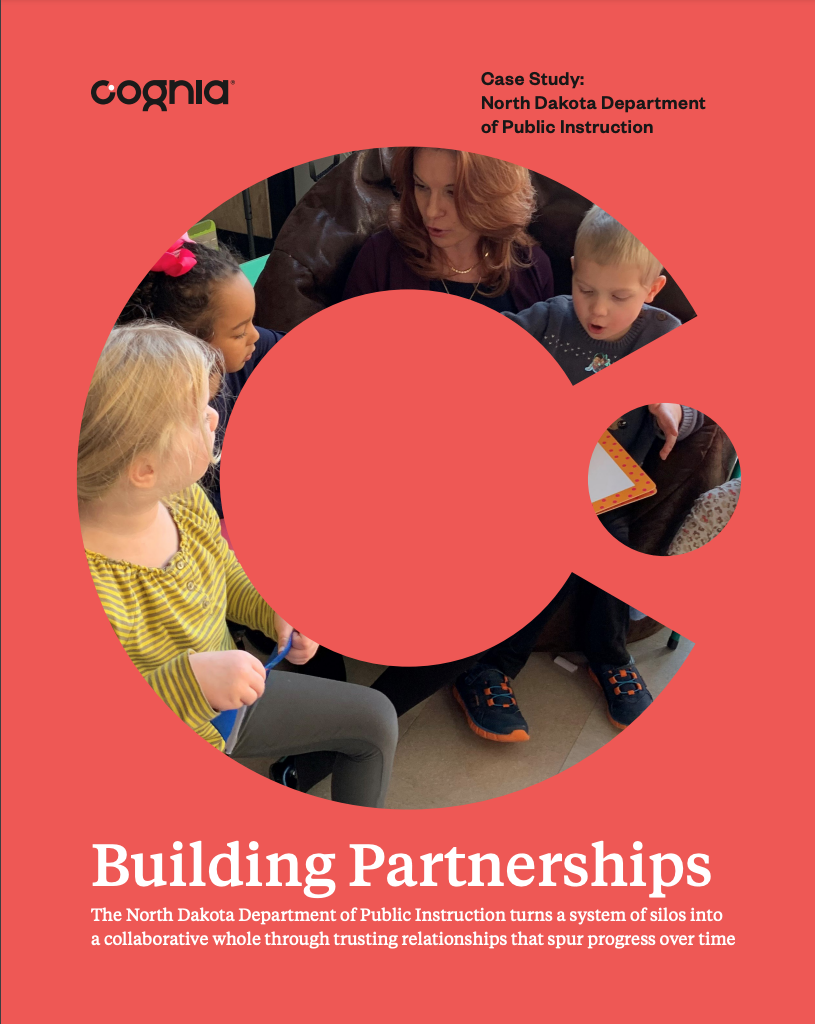In 2013, the North Dakota Department of Public Instruction (NDDPI) contracted Cognia to provide continuous improvement services for all public schools and districts within the state. That statewide partnership was the first of its kind, and it has led to Cognia supporting an increasing number of NDDPI divisions, such as the Office of Assessment, the Office of Special Education, and the Office of Academic Support.
State Superintendent Kirsten Baesler has described Cognia as a crucial partner in her efforts to support the continuous improvement of each school and district as well as the state department. In a recent interview, Baesler described her perspective on partnerships and some of the ways in which Cognia has worked side-by-side with the state department.
Question: Back in 2016, Cognia President and CEO, Dr. Mark Elgart, and other Cognia representatives participated in NDDPI’s ESSA planning meetings. What gave you the idea to bring in Cognia as a thought partner?
Baesler: Cognia was our partner in our continuous improvement work. As a result, we’d get their communications and publications. A white paper written by Dr. Elgart talked about states having an opportunity to redefine and reexamine improvement and help each school grow in that continuous improvement process using growth metrics. That really intrigued me.
I actually cold-called the office and said, “I’d like to have a conversation with somebody about this white paper and see how we might be able to leverage that in North Dakota as we are designing our application for Every Student Succeeds Act.”
I never really expected to have a conversation directly with Dr. Elgart but was thrilled when he was on the other side of that call! We had a very robust conversation. Dr. Elgart was saying things that really resonated with me.
Question: Did Cognia assist with the ESSA state plan in any way other than helping the committee devise a North Dakota-specific approach?
Baesler: We also pulled in Dr. Elgart and his team to be on calls with us and the U.S. Department of Education as we negotiated the approval of our state plan. Eventually, Cognia in partnership with the Department of Public Instruction, came up with a formula that was satisfying to the U.S. Department of Education and agreeable to us as a state. I’m not sure that we would have gotten the approval for our ESSA plan had it not been for that partnership with Dr. Elgart and his team.
“Progress travels at the speed of trust and trust begins with relationships.”
Question: Can you describe how the use of Cognia’s services and support has spread throughout NDDPI?
Baesler: When we were developing the first partnership, it was with our accountability office and our school approval office. Our seven regional education service agencies (REAs)—which provide districts with services like professional development, data analysis, high quality programming, and more—also became Cognia members and earned Cognia Accreditation.
We needed to ensure that all schools and REAs were engaged in a continuous improvement process and that those schools identified as needing a little bit more help and support were receiving the tools they needed. Then we started to see, “Wait a minute, there’s so much more that we can do.”
So then, we collaborated during ESSA planning on a student engagement survey that became part of our accountability system, which introduced Cognia to our Management Information System team. And right about that time, they had a new assessment and psychometrician division. So, our assessment people started partnering with that branch of Cognia to develop a growth metric which could be used in our accountability system as well.
Cognia also partnered with our Office of Specially Designed Service to streamline our special education units’ reporting process on how schools were supporting students with emotional disturbances. We have to report what evidence-based practices our schools are using to the federal government. First, Cognia designed a data tool called the PIER (Planning, Implementing, Evaluating Report) to collect that information more efficiently. And then later, they modified it to include suggestions for four evidence-based research-based tools schools can use.
Then the pandemic hit, and Cognia began working with our Academic Support team to assist us in supporting our teachers’ need to learn how to become better deliverers of information and instruction on a virtual platform. From that need was born a whole host of library resources [via the Cognia Learning Community*] which has continued to grow and improve. So, we introduced them to our academic support people.
Then along comes Leadership Circle. We understand how crucial leadership is to student success. So, we commit to supporting our leaders whenever possible, and we started to work with Cognia on support and development for our school leaders. We were pleased, when after we explained some of the roles our building leaders have in North Dakota, that they expanded those offerings to also support our principals.
I don’t think that there is a single office within the state agency that is not connected, working with, or involved with supporting the work of Cognia and the partnership. So, it is truly a State Education Agency (SEA) partnership with Cognia.
When I say “partnership,” I am absolutely non-negotiable about what that means. For me, that means you’re not going to sell me whatever your off-the-shelf thing is. If you want to be a partner, we’re going to have to build a plan and a deliverable together.
Question: What does the concept of partnership mean to you as a state superintendent?
Baesler: I share the story of when I was meeting with our state chamber president Bernie Dardis. I wanted to have a conversation about stronger internships and school-to-work partnerships. I sat down and I started talking about the materials that I’d brought.
He chuckled and said, “I thought we were here to talk about a partnership. But you have it all here. You have the plan. That’s not a partnership.” He said, “If you want to ask for our support on that plan, I’ll have that conversation with you. But that’s a different conversation.”
He said, “A partnership is when we sit down and none of us have anything on paper or concrete ideas. You have what you want. We have what we want. There’s some intersection of that, and we talk about what it is that you need and that we need. And we start to plan together and then at the end of the day, there’s a product that is better. And that’s a partnership.”
And I went, “Oh, hold the phone.” That was an enlightening moment, and I learned an important lesson that day.”
I talk to vendors all the time. There are times where they’ll have a plan that they’ve developed and charted out, and I’ll decide if it fits North Dakota. But when I say “partnership,” I am absolutely non-negotiable about what that means. For me, that means you’re not going to sell me whatever your off-the-shelf thing is. If you want to be a partner, we’re going to have to build a plan and a deliverable together.
Cognia has provided evidence that they can be a partner with us. When Jeff Rose brought up the Leadership Circle, it was only for superintendents. And we said, “That’s not what we need most. We need support for our principals, too.” So, they adjusted the model.
Question: One of your favorite sayings is “Progress moves at the speed of trust.” How does that saying relate to NDDPI’s partnership with Cognia?
Baesler: I generally add to that statement. I always begin with “Progress travels at the speed of trust and trust begins with relationships.” Relationships are an important part, and they are the beginning of that foundation of trust. I describe North Dakota as one community with a really long main street, and it really is all about relationships here. I would say that we have traveled quickly because of trust, but we have built that trust over the last decade because of the relationships and the time that we’ve taken to invest in the relationships between those of us at NDDPI and the people at Cognia
| NDDPI is taking its partnership with Cognia to yet another level, the two entities are co-designing the first State Education Agency Accreditation. For more information about Cognia’s work with NDDPI, read the case study North Dakota: Building Partnerships. |  |
*The Cognia Learning Community is a professional learning platform and community for educators to communicate, share best practices, problem solve, and deepen their practice of teaching and learning. The 24/7, online platform offers relevant, differentiated professional development when and where it’s convenient for busy educators.
© Cognia Inc.
This article may be republished or reproduced in accordance with The Source Copyright Policy.
The information in this article is given to the reader with the understanding that neither the author nor Cognia is in engaged in rendering any legal or business advice to the user or general public. The views, thoughts, and opinions expressed in this article belong solely to the author(s), and do not necessarily reflect the official policy or position of Cognia, the author’s employer, organization, or other group or individual.


